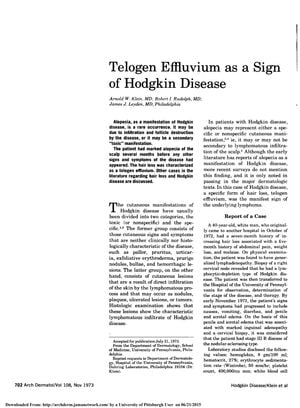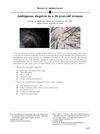Telogen Effluvium as a Sign of Hodgkin Disease
November 1973
in “
Archives of Dermatology
”

TLDR Hair loss may be an early sign of serious illnesses like Hodgkin disease.
In a case study from 1973, a 40-year-old man with Hodgkin disease exhibited marked alopecia, or hair loss, characterized as telogen effluvium, which is a form of hair loss where hairs enter the resting phase and subsequently fall out. This alopecia was a presenting sign of the disease, occurring several months before other symptoms such as abdominal pain, weight loss, and malaise. The patient's hair loss was most pronounced in the occipital and temporal regions, and a microscopic examination of plucked hairs showed that 85% were in the telogen phase. Histologic examination of a scalp biopsy showed no evidence of lymphomatous infiltrate, indicating that the alopecia was not due to direct infiltration by the disease but rather a nonspecific manifestation. The study suggests that telogen effluvium may serve as an early indicator of serious systemic illness, such as Hodgkin disease, especially when a high percentage of hairs are in the telogen phase. The importance of this finding is that it could herald a serious systemic illness, and the authors suggest that a high count of telogen hairs should prompt a search for an underlying condition.







